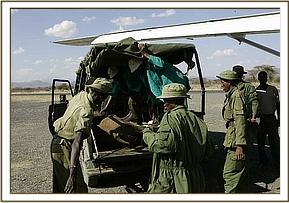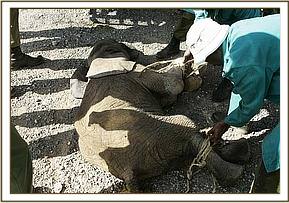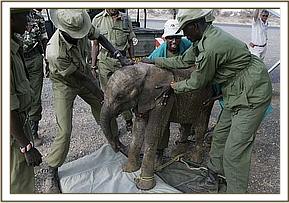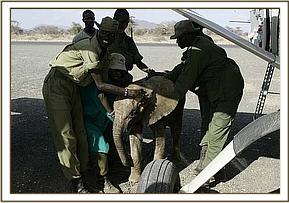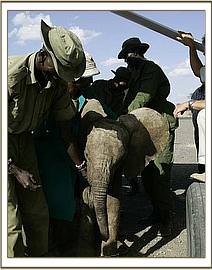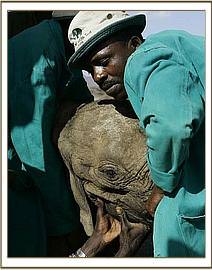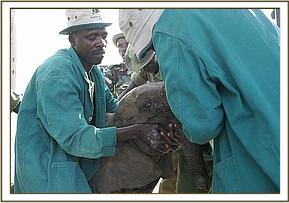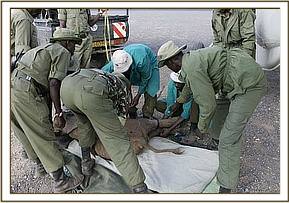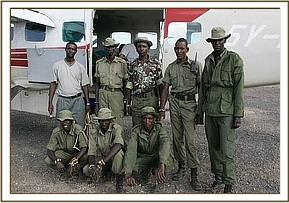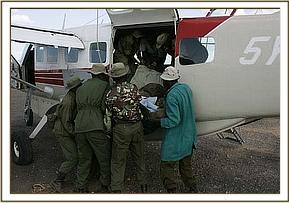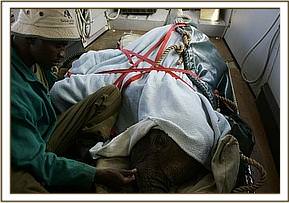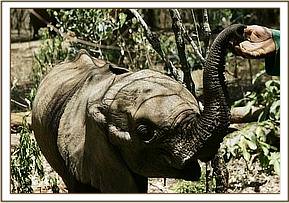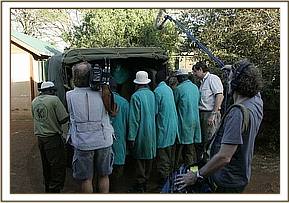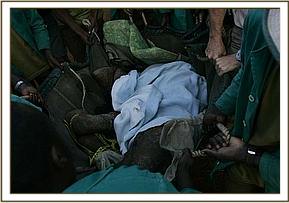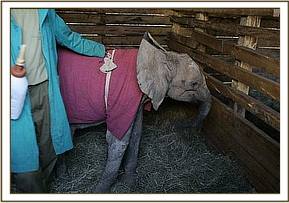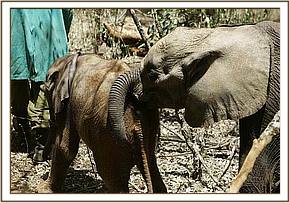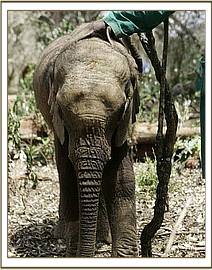









Now living wild, where she is the mother of an ever-growing family
Current age
20 years old
Gender
Female
Rescued date
15 January 2006
Rescue location
Samburu, West Gate Conservancy
Date of birth (estimate)
24 July 2005
Reason orphaned
Drought related
Age at rescue
5 months old (approx)
Current location
Living Wild
Since the failure of the November/December rains over most of the country, exacerbated by hotter than usual conditions, most of Kenya has been gripped by devastating drought conditions, its normally green pasture (at this time of the year) reduced to a desiccated and baked landscape. The drier than usual conditions have taken a terrible toll of all life, and not least the elephants, particularly those who have to eke out an existence in a naturally arid environment which yielded the latest two orphaned elephants to be brought into our Nairobi Nursery.
Recently, we have been receiving orphaned rescue alerts on an almost daily basis – one in the Masai Mara made by a visitor on a mobile phone via our UK Office, where the orphan turned out to be probably 3 years old, and therefore stood a better chance being left in situ rather than undergoing the trauma of a rescue in a weakened condition. On the 15th January 2006 - that quiet afternoon mentioned above - two calls, and from opposite ends of the country – one from Tsavo West National Park where a baby elephant had been spotted, wandering all alone, in an emaciated and dehydrated condition, between Ziwani near the Tanzanian border, and Kitani in Tsavo West National Park and the other from Northern Kenya in Samburu tribal country, where an orphan had been spotted by tribesmen near a swamp called Loijuk.
With time not on our side, all the stops now had to be pulled out. The two rescue planes left Wilson Airport, each within minutes of one another, with Keepers, milk and rehydration salts and everything needed to rescue an elephant aboard.
About half an hour later a 6 – 7 month old female baby arrived from a new conservancy established on the North bank of the Ewaso Niro River called the West Gate Conservation area. She was found abandoned close to a place called Loijuk, the name of an extensive wetland swamp. The tribesmen of this area are changing from being simply pastoral herdsmen of cattle, to caretakers of the natural environment, and they were delighted to welcome Robert Carr-Hartley, who arrived in the Rescue Plane, since most of them know Robert as a friend from his Safari Company operating in the area. It was very encouraging for him to learn how proud they were of their wildlife, including the little orphan they had just rescued and brought to the airfield, whom they had already named “Loijuk” after the beautiful seasonal swamp, currently parched and dry. She was found too all alone, in a weakened state, and so obviously an orphan, her mother probably having succumbed to the drought conditions. She had been cared for tenderly by the conservation area’s rangers immediately after the rescue, and then later made the 3 hour journey in the back of a land rover to the Samburu South Airstrip, the closest strip that could accommodate a Cessna Caravan aircraft.
Since the failure of the November/December rains over most of the country, exacerbated by hotter than usual conditions, most of Kenya has been gripped by devastating drought conditions, its normally green pasture (at this time of the year) reduced to a desiccated and baked landscape. The drier than usual conditions have taken a terrible toll of all life, and not least the elephants, particularly those who have to eke out an existence in a naturally arid environment which yielded the latest two orphaned elephants to be brought into our Nairobi Nursery.

View diary updates from across all our orphan units as written by the Keepers

On the back of unexpected early rains, we received another gift in Ithumba. On the morning of 22 February 2026, ex-orphan Ishanga returned home to introduce us to her brand-new baby girl, whom we’ve named Imp. This was a special moment for us, as Ishanga was quite literally rescued from the jaws of death.
Lili is Loijuk's first wild born baby. We met her on the morning of Sunday 1st September 2019, after her mother gave birth to Lili close to our Ithumba Reintegration Unit and chose to bring Lili to meet the Keepers - her human family - and dependent orphans at Ithumba, so that they might all join in celebrating this new life. Read more
Loijuk's second baby debuted on 11th April 2023, when she was just hours old. We can't help but note how her arrival coincided with the sixth anniversary of Daphne Sheldrick's passing: As she always said, by saving the life of one orphan, we pave the way for generations of elephants. Lisha is an energetic, healthy young girl, fiercely protected by her big sister and nannies. Read more
By adopting, you play a vital role in the life of an orphaned elephant, rhino, or giraffe — helping us provide the round-the-clock, loving attention each one needs and deserves over many years, so they can ultimately reclaim their place in the wild.
Your adoption supports the 100+ orphans in our care at any given time, covering the cost of milk and food supplies, Keepers' salaries, veterinary treatment, and other essentials.

Celebrate your adoption with a personalised certificate, ready for you or your lucky gift recipient to print and display!

Each month, we send a detailed update about our Orphans’ Project direct to your email inbox, featuring photos, stories, and special highlights.

From the latest Keepers’ Diaries to a downloadable image gallery and more, adopters have exclusive access to our content library.
